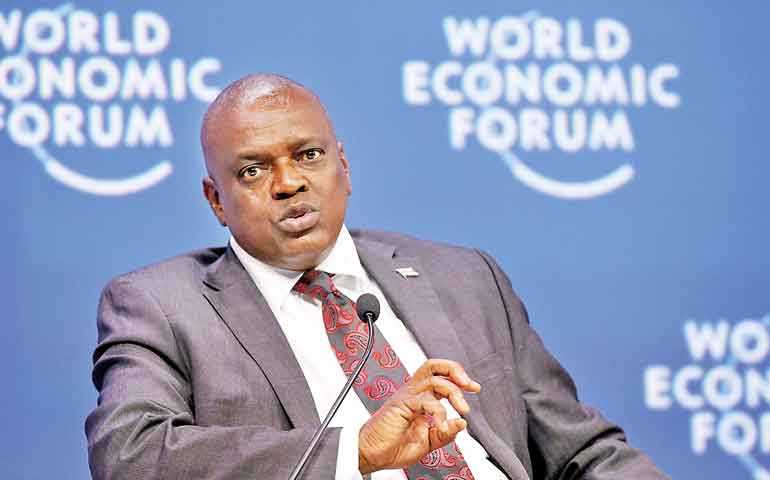Tuesday Feb 17, 2026
Tuesday Feb 17, 2026
Tuesday, 22 October 2019 00:03 - - {{hitsCtrl.values.hits}}

President of Botswana Mokgweetsi Masisi speaks at a session at the World Economic Forum on Africa in Cape Town, South Africa - Reuters
Reuters: For the first time since it won independence from Britain in 1966, Botswana faces a genuine electoral contest on Wednesday, as a feud between its current and a former president throws one of Africa’s most stable nations into uncertainty.
The Botswana Democratic Party, in power since Independence Day, faces an unusually tough parliamentary vote, after the country’s former president and political heavyweight Ian Khama fell out bitterly with his hand-picked successor, President Mokgweetsi Masisi, earlier this year.
There is no clear winner in sight and little to distinguish the contestants on policy. But whichever party wins will inherit the unenviable task of tackling high unemployment, inequality and over-reliance on dwindling diamonds, which turned Botswana into one of Africa’s wealthiest nations but cannot lift living standards forever.
Khama, the son of founding President Seretse Khama, has thrown his weight behind an opposition coalition led by human rights lawyer Duma Boko. The outcome of Wednesday’s vote will also determine who becomes president.
“We are putting an end to this misrule by the BDP. We want our people to be more empowered and to enjoy more of this country’s economic opportunities,” Boko told a news conference on Thursday, promising to create 100,000 jobs, raise the minimum wage and grow the economy by more than 6 percent a year.
Since freeing itself of its former coloniser, Botswana has bucked the trend on a continent often beset by post-independence civil conflict, autocratic leadership, and the squandering of natural resources by elites.
It has enjoyed peaceful, regular elections, and its vast diamond wealth, instead of fuelling war and rampant state theft, has been judiciously spent on free education and health.
The result: after decades of growth averaging 8 percent a year, per capital Gross Domestic Product is more than $ 8,000 — eight times that of Zimbabwe, five times Zambia, and about two-thirds more than Namibia, its neighbours.
But clouds are gathering. Botswana’s diamond sales fell 16% in the second quarter of 2019, and a partnership between Anglo American’s De Beers and Botswana reported that production fell by 9% to 5.7 million carats in the second quarter. GDP growth is projected to slow to 4.3% in 2019, from 4.5% last year, and the economy remains vulnerable to swings in diamond prices and output.
Botswana’s 2019/20 fiscal deficit is predicted to be 3.8% of GDP, up from an earlier forecast of 3.5%, as revenue growth slows against accelerating spending.
Although the country has diversified sources of economic growth with mining’s contribution to GDP falling from about half in the 1990s to a fifth in 2018, exports are still precariously diamond-dominated, at 75% of foreign exchange earnings.
Banking and tourism are stepping in to fill the gap, but they have failed to generate enough jobs, with unemployment at 20%.
Faced with these challenges, there is little difference between the policies of any of the four candidates.
“We want to create more jobs that are sustainable, improve the quality of our education to make youths job-ready and competitive as a well as give you better healthcare,” Masisi said during a presidential debate held this week.
The original quarrel between Masisi and Khama concerned something Botswana has excelled at: preserving its elephants, even as they have come into conflict with its mushrooming human population.
Answering a call from farmers angry at having their crops ripped up by hungry elephants, Masisi in May reversed a 4-year-old hunting ban put in place by Khama, a keen conservationist.